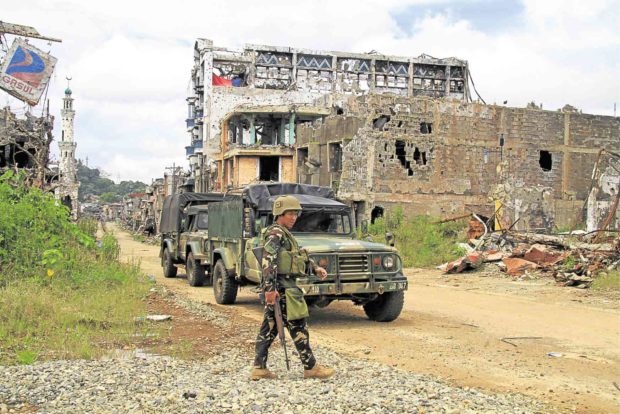
TERROR WATCHSoldiers secure areas cleared of Islamic State fighters in Marawi City in March to prevent a return of terrorists to the place. —RICHEL V. UMEL
MARAWI CITY—One of several groups representing residents of this bombed out city vented its ire on the government’s insistence to hand over the city’s rehabilitation to mainly Chinese financiers, saying city folk could lose land in the process.
Drieza Lininding, chair of Moro Consensus Group, said his group continued to oppose all joint venture proposals from private investors to rebuild the city because these plans meant investors would have to recoup their money.
“We don’t want private investors to have joint venture agreements within the MAA (most affected areas),” Lininding told the Inquirer by phone, referring to the 24 villages that constituted ground zero of the war on Abu Sayyaf and Maute followers of Islamic State last year.
How to repay
“If the Chinese does something under Build Operate Transfer they would surely want to profit from it,” he said.
“But without a feasibility study, how would they know if their ventures would earn or not?” Lininding added.
“So what happens when they don’t earn? How could we repay them? We would end up losing our land,” he said.
He expressed dismay that while it was too easy for the government to bomb residents’ houses and buildings, it was too reluctant to spend for the bombed out areas’ rebuilding.
“It was so easy for them to destroy but when it comes to rebuilding, they leave it to private developers,” Lininding said.
“And we end up losing our lands. Where is justice here?” he said.
Another China firm
Secretary Eduardo del Rosario, of the Housing and Urban Development Coordinating Council and chair of Task Force Bangon Marawi, said the rehabilitation contractor would be known next week when negotiations would have been completed.
Del Rosario, at a press briefing in the Lanao del Sur provincial capitol on Friday, said groundbreaking rites for the rehabilitation program, initially set in June or July this year, had again been moved to September.
Visit
He said a committee selecting the contractor had been negotiating with Power China, a Chinese government-owned company and builder of a 550-megawatt coal power plant in the town of Kauswagan, Lanao del Norte province.
SECURITY ESCORTSA soldier escorts a group of Marawi City residents, during its visit to ground zero to see where villagers’ houses once stood. —RICHEL V. UMEL
Del Rosario also said another program to allow displaced residents to visit their homes, called Kambisita II, would be launched on Sept. 10.
This would let homeowners establish and locate the exact boundaries of their home lots before workers clear the areas of debris, Del Rosario said.
Col. Romeo Brawner Jr., regiment commander of the Civil Military Operations Group overseeing soldiers’ involvement in the rehabilitation plans, said 18 Army teams would be formed to help survey teams of the Department of Environment and Natural Resources.
The Army teams would undergo training before the actual land survey, Brawner said.
Littered with bombs
Brig. Gen. Ramiro Rey, head of the antiterror Joint Task Force Ranao, said a road used by civilians in Mapandi, an area in Marawi, had been closed after a 500-lb unexploded bomb was found there on Aug. 5.
Rey said the Army’s engineering Explosive Ordnance and Disposal Unit had excavated and detonated the bomb and found another one underneath.
Rey said several unexploded bombs had been recovered earlier by the unit.
“No one is allowed yet to enter until the place is totally cleared (of unexploded ordnances),” he said.
Brawner said the establishment of a military camp in the city would push through and the government was now in the process of negotiating with the owner of the land that would serve as the camp site. —REPORTS FROM GERMELINA LACORTE AND RICHEL V. UMEL

